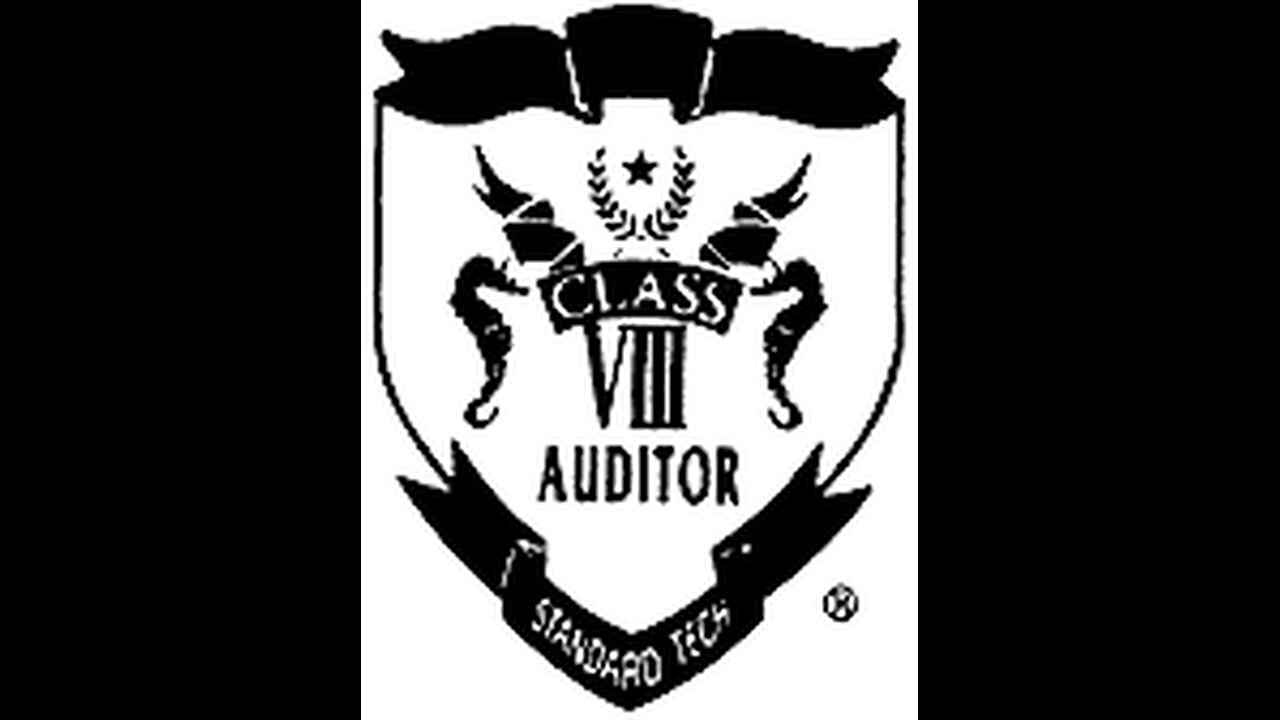Premium Only Content

Class VIII Course #5 Green Form
Warning: Contains OT III Data.
Resume of Class VIII Lecture 5 (28 Sept 1968)
Opening Context
Hubbard begins by emphasizing the importance of Standard Tech and how deviations (altered bulletins, misapplied procedures, or arbitrary additions) lead to failures in results and morale.
1. Floating Needles & Errors in Auditing
Warns against false F/Ns (floating needles) caused by poor TRs, busted E-meters, or misunderstood needle phenomena.
Example: Stage four needle – appears to “float” but is not connected to the PC.
Stress: auditors must inspect after the fact, not add arbitrary checks before.
2. Auditor Responsibility
Hubbard criticizes “nickel in the slot” rote auditing.
True auditing requires understanding, not just applying canned commands.
Example: "Rehab former releases" → auditor must figure out how, not demand rote scripts.
3. ARC Breaks (Affinity-Reality-Communication Breaks)
Never audit over an ARC break → it leads to sad effect, no exceptions.
ARC breaks must be pulled first in session.
Distinguishes between real ARC breaks, false reads, and situations where “ARC break” = missed withhold.
Anecdote: at Saint Hill, a PC was in grief for 3 months because no one pulled her long-duration ARC break.
4. Present Time Problems (PTPs)
Auditing over a PTP prevents case change.
Must handle PTPs before proceeding.
If no read appears but PC clearly has a PTP → check for suppression or earlier-similar.
5. Withholds & Missed Withholds
Never proceed with unhandled withholds.
Must always get “where, when, and by whom it was missed.”
Rock slams can be linked to withholds; danger if mishandled.
Auditors often mistake missed withholds for ARC breaks.
6. Rudiments & Repair
Rudiments (ARC break, PTP, withhold) are non-negotiable; can’t be skipped.
Green Form handling: only itsa, earlier-similar, or listing.
Avoid rote “fumble-bumble”; auditor must think and apply.
When a wrong item causes ARC break, handle it directly (don’t Q&A with endless ARC break questions).
7. Student & Auditor Mindset
Students/auditors don’t “have cases” during training or auditing.
Hubbard insists: do not confuse teaching with case handling.
8. Grades & Standard Tech
Grade processes are exact, no wording variation allowed.
Rudiments allow variability, but Grades are rigid and precise.
Main rule: always set PC up properly before the next Grade.
9. Secondaries & Engrams
Secondary running (losses, fear incidents) and Engram running are essential skills.
Warns auditors not to avoid these (lazy auditing).
Running a secondary/engram to F/N → can erase incident permanently.
Example: running engram reduced a physical goiter within 30 minutes.
Must know the earlier-similar rule: if incident grows more solid, find an earlier one.
Emphasizes this is true from assists up to advanced levels (OT III+).
10. Assists & Exceptions
When life interventions (death, accident) derail case progress → run appropriate secondary/engram.
Explains use of contact assists, touch assists, and full engram running.
Closing Points
Auditor must understand the mechanisms of release and erasure.
Standard Tech is powerful but demands precision and discipline.
Deviations, laziness, or “rote” auditing are destructive.
Running engrams and secondaries should never be dropped from a Class VIII auditor’s repertoire.
-
 LIVE
LIVE
Grant Cardone
3 hours agoHow to Find Your First $1million Profit In Real Estate
2,675 watching -
 54:54
54:54
iCkEdMeL
1 hour ago $16.26 earned🔴 BREAKING: Gunman Opens Fire at Tim Pool’s Home
21.5K18 -
 LIVE
LIVE
I_Came_With_Fire_Podcast
11 hours agoPuerto Rico, Corruption, Ther Sterilization of Women, and the Bankers Behind it All
650 watching -
![Mr & Mrs X - [DS] Pushing Division, Traitors Will Be Exposed, Hold The Line - EP 18](https://1a-1791.com/video/fwe2/96/s8/1/w/U/W/F/wUWFz.0kob-small-Mr-and-Mrs-X-DS-Pushing-Div.jpg) 54:40
54:40
X22 Report
5 hours agoMr & Mrs X - [DS] Pushing Division, Traitors Will Be Exposed, Hold The Line - EP 18
96.6K22 -
 LIVE
LIVE
ttvglamourx
2 hours ago $1.78 earnedHAPPY SATURDAY !DISCORD
208 watching -
 18:53
18:53
Wrestling Flashback
23 days ago $9.41 earned10 WWE Wrestlers Who Ruined Their Bodies Wrestling Too Long
29.3K4 -
 LIVE
LIVE
Amarok_X
3 hours ago🟢LIVE WARZONE | LETS SQUAD UP | PREMIUM CREATOR | VETERAN GAMER
172 watching -
 27:03
27:03
The Kevin Trudeau Show Limitless
3 days agoThey're Not Hiding Aliens. They're Hiding This.
62.9K87 -
 22:17
22:17
MetatronGaming
6 days agoI spent 7 days in the 1980s
25.1K8 -
 LIVE
LIVE
FrizzleMcDizzle
3 hours agoGRINDING new NightReign content - COME HANG
68 watching